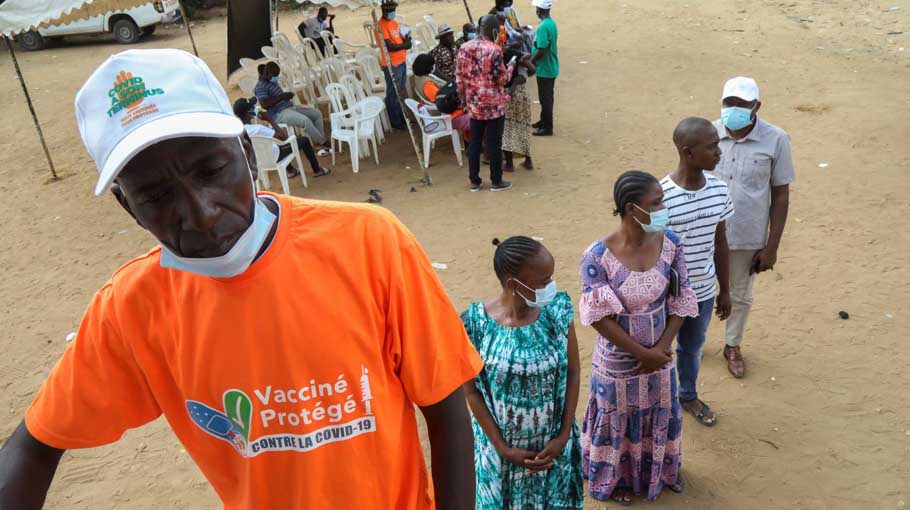Omicron is the price we pay for vaccine inequality

Enlightened self-interest — ensuring that the developing world is getting COVID-19 vaccines — isn’t all that it’s cracked up to be.
That shouldn’t be a surprise since self-interest, or getting vaccinated, doesn’t seem to be much of a motivator either. Yet discovery of the omicron variant — the new COVID-19 mutation that is ringing alarms and shutting doors around the world — is proof that vaccine inequality is everyone’s problem.
B.1.1.529 is the new COVID variant. Dubbed omicron, the World Health Organization (WHO) said the first confirmed specimen was detected Nov. 9 in Botswana. Most subsequent cases have been found in southern Africa, although it’s rapidly spread worldwide. Blame international air travel: Schiphol Airport in Amsterdam went into lockdown last weekend as 61 passengers on two flights from southern African countries tested positive for the coronavirus. Cases have also been detected in Japan, Hong Kong and Israel, among others.
The Japanese government on Tuesday confirmed its first case of the new omicron variant after a 30-year-old man who arrived at Narita Airport on Sunday from Namibia tested positive for the virus. The government Monday announced it was closing its border to all foreign visitors, joining a long list of other countries that have imposed new restrictions on travel.
Before we go any further: There is no reason to panic. Viruses mutate all the time and there is little information about omicron. Scientists don’t know if it is any more infectious, lethal or resistant to vaccines than the original bug or any of the other variants.
We can be sure of one thing, though: If omicron poses a threat, it’s the result of vaccine inequality. The appalling divide between vaccine haves and have-nots will ensure that we are regularly visited by new and alarming COVID-19 variants. As Glenda Gray, head of the South African Medical Research Council, warned “Until we vaccinate enough people we’re going to have this happen over and over again.”
The numbers are dispiriting. In August, of 15 billion total COVID-19 doses, high-income nations took 6.6 billion, 2.5 billion went to upper-middle income countries, lower-middle income countries got 3.2 billion and 331 million went to lower-income countries. The global COVAX consortium, which targets 92 low- and middle-income countries, aims to put 2 billion doses in arms by the end of this year. That number looks more impressive than it is: Donors pledged 1.3 billion doses but only 356 million have been provided.
By mid-August of 2021, COVAX delivered 200 million vaccine doses instead of 600 million, as initially projected. In September, Japan pledged to double its vaccine assistance to 60 million doses, half through COVAX and half bilaterally. It promised an additional $1 billion for the COVAX facility. At the time, it had provided 23 million doses bilaterally, as well as oxygen concentrators and ventilators and so-called last one mile support, such as refrigerated trucks and other cold-chain equipment needed to get vaccines to remote areas.
But the bottom line remains grim. A mere 6% of the 1.2 billion people living in Africa have been vaccinated. In South Africa, the official number tops 35% (other estimates are lower), which is less than half the country’s target for 2021.
Most experts blame the shortfall on “vaccine nationalism” in the developed world. That isn’t the entire explanation — vaccine skepticism isn’t just a first world phenomenon — but it is a lot of the story. That’s the conclusion of a new study by Airfinity, a science analytics consultancy. According to its data, Group of 20 countries received 15 times more COVID-19 vaccine doses per capita than countries in sub-Saharan Africa, 15 times more doses delivered per capita to low-income countries and 3 times higher the doses delivered per capita in all other countries combined.
Gordon Brown, the former British prime minister who is now a WHO ambassador, vented in the Guardian last week, arguing that “Despite the repeated warnings of health leaders, our failure to put vaccines into the arms of people in the developing world is now coming back to haunt us.”
He blamed the selfishness of the richest nations. They have “monopolized” 89% of vaccines manufactured as well as 71% of future deliveries. Worse, Brown charged the EU with “neocolonialism” for “commandeering” vaccines made in South Africa.
I can’t summon Brown’s anger and outrage; I’m more comfortable with irony. So, I note, first, as millions of Americans were (rightfully) being thankful for their shots and boosters, news broke of a new variant that threatens to undermine the security that they celebrated. (If their good fortune is the result of deprivation elsewhere, then the right term might be tragedy, not irony.)
Failure to provide vaccines to the world’s poorest countries doesn’t just hurt them — as events this week make abundantly clear. If morality isn’t sufficient motivation, pure selfishness should have done the trick. Governments are cutting off international travel as economists and officials revisit all their assumptions about economic recovery and now anticipate a slowdown in growth.
Governments have moved quickly to slam the door on omicron. We’d be better served by an equally expeditious and determined effort to get vaccines to the poorest among us. As Henrietta Fore, executive director of UNICEF, the U.N. children’s agency, warned, “in the COVID vaccine race, we either win together, or we lose together.”
Brad Glosserman is deputy director of and visiting professor at the Center for Rule-Making Strategies at Tama University as well as senior adviser (nonresident) at Pacific Forum.
Source: The Japan Times




